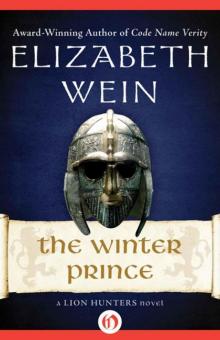- Home
- Elizabeth E. Wein
A Coalition of Lions Page 5
A Coalition of Lions Read online
Page 5
So Priamos explained how it had started by mistake, and how a settlement had been reached before it began, and how he had hoped to discover the prince of Britain’s fate through his own surrender. He took full responsibility for his actions, and I thought he acquitted himself well.
When Constantine spoke, he always seemed to ask things that Priamos could not possibly know, or which Constantine should know himself.
“You have said the southern ports are in Cynric’s hands: which are the southern ports?”
“Has Cynric allegiances among the Saxon pirates?”
“What was the strength of the Deva garrison before it was reduced?”
What did that matter?
“What is the present strength of the Deva garrison?” asked Danael.
Priamos waited patiently for the question to be translated for me before making an answer.
“I cannot guess with any accuracy,” he said in Ethiopic.
There was a long silence.
“I cannot guess with any accuracy,” Priamos repeated in Latin.
“You cannot guess?”
“I do not know.” There was another long pause. Priamos sighed, and translated. “I do not know.”
“Guess without accuracy,” suggested Constantine.
Priamos said hesitantly, “Two thousand, perhaps.”
“Closer to twenty-five hundred,” I said in Latin, “with five hundred more relocated to Melandra.”
There was a moment of frozen quiet.
Before anyone could repeat or translate my answer, Constantine asked, “How do you know that?”
“I ordered it,” I said, and straightened my back. I had been leaning forward for so long, with such intense concentration, that my neck ached. “I ordered the dispersal of all the infantry that fought at Camlan. As I ordered Caleb’s trove of silver to be locked in the underground vaults at Elder Field, near Camlan.” I turned to the afa negus. “Do you tell them what I said.”
If I had not been so outraged at their criminal treatment of Priamos, I would have laughed at the court’s reaction when Halen repeated my speech. Wazeb did laugh, out loud and in delight. He had straight teeth that were bright in his dark face, and a smile that came and went as quickly as lightning in a thunderhead.
Zoskales, the eldest of the council, asked in Ethiopic, “Who is she?”
The translator did not repeat this. I realized that half of them assumed I did not understand a word that was spoken unless it was in my own language.
I answered the question in Ethiopic. “I am Goewin the dragon’s daughter. I am the only living child of the king whose wealth you have discussed all this afternoon.”
Priamos, who had not yet spoken a word unless it was required of him, said now: “She is rightfully high queen of Britain, negeshta nagast, queen of kings. It shames me that we are not all on our knees before her.” He added recklessly, “And he who calls himself Ella Amida will not come into his own inheritance without her blessing.”
It threw them into uproar. Most of them came to their feet; Kidane and another three bowed, including Danael and Ityopis. Two more began to rise, then sat again.
“Who let her in, then?” the old man muttered. “I do not understand who let her in.”
“SHE IS DAUGHTER TO THE KING OF BRITAIN,” his neighbor bellowed at his ear.
“She is the viceroy’s betrothed. She is the viceroy’s betrothed,” said Priamos in Ethiopic and in Latin. In the frantic astonishment that followed, Priamos enthusiastically repeated this last in Greek and Arabic, and finally, for good measure, in Hebrew.
Wazeb gave another bark of delight.
“We will come to order!” Constantine thundered. “Zoskales, do you sit on this council to prescribe laws or to nap? And you, Ras Priamos, I swear, if I am made to endure one more insolence from you I will set you to cutting salt blocks in the desert for the next two years, do not doubt me. Now let us finish this! I cannot spare another afternoon—”
“You have a season of afternoons to spare,” I blazed, and I was on my feet with the rest of them. It was all I could do to keep from striking him in the teeth. “The long rains are upon us. I may have no jurisdiction over Priamos in this land, but by my father’s sword, I am your queen, Constantine. Ella Amida. Whoever you are. Detain Priamos here if you must, but save for me your questions over my father’s wealth and the size of his armies! We shall discuss Britain at length before either of us is able to travel there. You may schedule interviews with me over all this season, but I will see an end to this inquisition of my ambassador!” I sat down and added, “Now, shall you exile me for insolence?”
It was the end. There were no more questions. Priamos was taken back to his room, and Kidane and I walked home together through pouring rain.
PART II: STALEMATE
CHAPTER V
A Red Sea Itinerary
“WHY ARE YOU SAD?” Telemakos said to me suddenly.
I stood in Kidane’s reception hall, arms folded, staring out the tall windows at the dripping forecourt. Telemakos was trying to teach one of the parrots to whistle as he did, through the gap in his teeth.
“You look sad,” he repeated.
“The rain makes me homesick,” I told him. “What do you do all winter?”
“Beg Grandfather to take me to the New Palace with him,” Telemakos answered readily, in between whistles.
“What is there to entertain you in the New Palace?”
“I play gebeta and santaraj with the queen of queens. And I play with the animals. Candake has very clever cats: we make them do tricks. She tells good stories, too. I like the queen of queens. She is beautiful.” He whistled again, speaking absently, concentrated on the parrot. He had an unintentional habit of narrowing his eyes and lifting one white eyebrow when he was focused on something, which made him seem deceptively calculating and precocious.
“I help the animals keeper,” Telemakos continued. “And—” He whistled, and laughed, because this time the parrot answered him. “Well done, Rainbow!”
“And?” I prompted.
“I like to listen to the courtiers.”
“Don’t they mind?”
“They never notice,” he said casually. “Grandfather is always telling me to listen.”
“Do you hide sometimes?”
Still coaxing the parrot, Telemakos did not blink or falter; but he did not answer me immediately.
“I might,” he said at last, “sometimes. If Grandfather were looking for me, perhaps.” He laughed again. “I’m always hiding from Grandfather.
“You should come with me when I visit the queen of queens,” he added. “She will want to play with your hair, and she always has the best sweets.”
“I will,” I said decisively. “I have to go tomorrow to talk to Constantine, anyway. And I want to see Priamos again.”
The guards at Priamos’s door bowed politely to me and ushered us through. We found him sitting on the floor of his room, sorting through a heap of books in at least five languages.
“Ah, Princess, how kind of you to bring me entertainment!” Priamos exclaimed. “I have read all of these a dozen times apiece.”
“Why don’t you walk about the palace more?”
“I cannot go anywhere without the imperial guard breathing down my neck. I would as soon stay here. My childhood at Debra Damo has accustomed me to stricture.”
I could not understand the stricture of his childhood. I asked, “Why were you sent there, Priamos?”
“It is traditional,” he said mildly. “The emperor’s male relatives are always closely guarded, so we may not overthrow him. My brother Mikael, eldest son of the queen of queens, will never be set free. A good many think Caleb a madman to have been so generous toward the rest of his sister’s sons.”
“They say the same of my mother,” Telemakos agreed with sympathy, pushing aside the books so he might sit cross-legged on the floor next to Priamos. “The queen of queens is always telling me how lucky I am not to be
sequestered myself. She says it happens, sometimes, to noble children whose fathers disappear.”
What a strange world you live in, I thought.
Telemakos began picking up books also, opening them and making little grunts of distaste or dismissal as he discovered the contents of each.
“If I were imprisoned in this palace, I would stay always in the Golden Court,” I said. “It’s so light there, and I love the sound of the fountains.”
“Pah!” Priamos made a gesture of disgust. “I hate the Golden Court. All those chained monkeys. They make me sick.”
“I like the monkeys,” Telemakos said.
“It is the chains I object to.”
Priamos glared down at his disordered books. I knelt to stack them for him.
“How long will your detention last?” I asked. “We were going to hunt together.”
“We may yet. We could not go now in any case, while the rains persist.”
“Rain makes the princess homesick,” Telemakos said. “Is it really like this in Britain, all the year long? I should hate it. I like to be outside.”
“So do your monkeys.”
We both gazed down at Telemakos’s shining head, bent in concentration over Priamos’s books. It was as though I held this child tethered by an invisible lead, a chain even lighter and stronger than the gold that bound the monkeys. He did not know he wore it, but I held him captive and condemned as if the links were real.
Telemakos seemed to pay no notice to either of us. Priamos rubbed one of his narrow hands around the opposite wrist and looked up.
“How have you entertained yourself since your arrival in Aksum, Princess?” he asked me.
“Constantine and I meet every day. We’ve got half a dozen meetings scheduled over the next week; we are supposed to work out a plan for my return to Britain.”
Sifting through documents in his office, Constantine and I tried to piece together what we still owed Aksum in borrowed revenue or goods not paid for. Behind Constantine’s records in his files were other documents, written in Ethiopic or Greek, but signed or annotated in Latin in Medraut’s firm, spare hand. Medraut had rarely put his name to anything, I came to realize; he signed himself anonymously “Ambassador of Britain” or “Envoy of Artos.” His record keeping was complicated and meticulous, but Constantine had made a faithful attempt to equal it. I would never grow to like Constantine, yet I was beginning to see why Caleb thought he would make a decent viceroy, and even why my father had placed him in line for the British kingship.
Wazeb was always there as well, listening without watching us, his head tilted to one side as Halen whispered brief translations at his ear. Once, when Constantine and I had become embroiled in yet another bitter argument, Constantine had turned to Wazeb and said apologetically, “We dishonor you, debating so in your company.”
“Not at all,” Wazeb had answered lightly. “It is very interesting.”
It made my neck go tense, thinking about it.
“Constantine has wealth my father did not have,” I said to Priamos. “I have allegiances his father does not have. And I know where my father’s soldiers are stationed, and their numbers and strengths, and which parts of Mercia had an abundant harvest last year and so on—but I dislike Constantine so much I don’t want to tell him anything. We scarcely greet each other before we are battling, and we get nowhere, and each day we begin again at the beginning. I have said I will not marry him unless he lets me choose an heir.”
“Ah, queen of kings indeed!” Priamos laughed. “A princess at liberty to choose her father’s heir! How you have turned your weakness to your advantage. Or is it more like a hostage negotiation?”
“That,” I said, and reached to take the book Telemakos held, “that is a thing we do not talk about.” I closed the book and put it aside. Telemakos picked it up again. “I grow weary of my fruitless interviews with Constantine. We will have nothing to say to each other long before winter is over.”
“You must think of some occupation,” said Priamos. “I am teaching the tame lion to read the testaments in Greek.”
“Teaching the tame lion to read Greek? What are you talking about?”
“It is my mother’s name for Wazeb,” Priamos said. “It is a greater compliment than you might think. A tame lion is less predictable than a chained one. Isn’t that right, young lion tamer?”
Telemakos did not answer. He was frowning studiously over the volume I had tried to take from him. He cried, “Oh, look at this!” and began to unfold a page. Spread out, it entirely covered his lap. “Oh, what is this a map of? I can’t read Greek either—”
I bent over his shoulder. It was a map of the world.
“Here’s Aksum—” I pointed “—where we are now. And here is Britain, where I come from. I can show you the way we traveled, look, starting up here, following the coast past Britanny and Iberia—”
We were both suddenly absorbed. Telemakos held the map open, his touch light and careful. He watched my finger tracing its path across the papyrus and nodded as I listed the Mediterranean ports where we had stopped.
Priamos watched us. When I looked up at him again he said, “I did not know you read Greek.”
“I don’t. My mother was a mapmaker. She taught me to draw the projections in Ptolemy’s Geography. I can’t read the names, but I know the map very well. What is this book?”
“It’s a Red Sea Itinerary. It’s a shipping guide. I wish we’d had this on our voyage; it might have stopped you always questioning our route.”
“I only questioned when you suddenly changed our route, before I knew we were followed. Look, Telemakos, here is Gabaza, the customs point for ships arriving at Adulis. I thought I would not be able to breathe, it was so hot when we landed there. It was so strange to me. But there was another white passenger on our ship, a merchant sailor who could not speak, and while I was waiting to disembark I watched him making his way through the crowd on the quay. He gave me courage. I’d never met him face-to-face; I only ever saw his back. But he gave me courage. He walked haltingly, like the rest of us, unused to land beneath his legs, but he moved with such confidence and purpose. I thought that if a man who could not speak was able to face strangers so fearlessly, then so should I be able to. And see, when I arrived, there were no strangers after all. There was you.”
“Show me how you came here from Adulis,” Telemakos demanded.
“Goodness, haven’t you had enough of maps yet?”
“I love maps,” Telemakos answered promptly.
Priamos laughed. “Well, see, both of you. I bought this edition because of the maps.”
He lifted the book from Telemakos’s lap and folded the wide sheet back in place. “Here is the road from Adulis to Aksum,” Priamos said, turning pages over. “And look, let me show you my favorite. Here is the road to Debra Damo, the cliff top hermitage where I and my brothers were sequestered.”
The picture was so stylized that you could scarcely call it a map: it showed an entire landscape. The road was drawn as a thin line with a cross marked at either end, and hatchings and bends here and there to mark turnings along the way. Around the road were miniature sketches of trees and animals and villages, all leading to a wide plateau with a geometric Aksumite church perched on its flat height. Below the church there lurked a serpent the size of an elephant, stretching its fearsome coils up the cliff side.
“What on earth is that?” I asked. “Have they got a dragon to guard you there?”
“The saint who founded the monastery was lifted to the top of the amba plateau by a flying serpent,” Priamos said. “Or so the stories say. In its place now they have a leather rope. There is no other way in or out.”
“You’d be very safe,” said Telemakos.
“Some people go there for sanctuary,” Priamos said. “But my brother Mikael has spent his life imprisoned there, and that is not the same thing at all.”
Priamos closed the book and reached out to lay it atop one of the stacks I
had made. Beneath his shamma his arms were bare, and I noticed again the small, stick scars on his wrists. They were so faded you could only see them when they caught the light.
“Goewin wants to meet your mother,” Telemakos said. “Will you take us to her, Ras Priamos?”
“That I will do with pleasure, Telemakos Meder. I may not stay, though.”
Candake the queen of queens, negeshta nagashtat, was enormous. I have since heard many people call her beautiful, as Telemakos did, and so she is; but still Caleb’s elder sister was bigger than any human being I have ever seen. She must have weighed as much as a small buffalo. She was not able to move as quickly as a buffalo, though, and was surrounded by a swarm of attendants who helped her to sit and to stand, and who seemed to feed her constantly. Her hair had gone salt white, and there were dozens of fine gold chains woven into her tight plaits. She was wonderful, and terrifying; in her own way, eerily, much like my aunt Morgause.
“Ah, you bring her to me at last, Priamos! How I have longed to see this girl! The queen of queens beholds the—what did you call her in the tribunal?”
“Queen of kings,” Telemakos supplied.
I wondered, Where did you pick up that?
“The queen of kings.” Candake creased and cackled with uncontrollable laughter, and leaned forward to grab Telemakos’s hands and swing them back and forth as though she were dancing with him. “Queen of kings! Like Cleopatra!” I thought she was going to choke herself laughing. “Or Makeda, the queen of Sheba, the mother of us all! Ah, Priamos, no other of my children could have been destined to speak as the mouth of the king; you have the flyaway tongue of a catbird.
“Girl, do you know what he said when he came before my brother Caleb for the first time, what he called the negus? ‘Solomon,’ he said. ‘Solomon walks among us in your wisdom.’ And Caleb said it was bad enough he had a base traitor in one nephew, without another being a groveling sycophant.”
“My lady mother, I am supposed to go and repeat to my old tutor what little I have learned of the British tongue,” Priamos interrupted quickly. “I will leave you alone with the princess.”

 The Pearl Thief
The Pearl Thief Cobalt Squadron
Cobalt Squadron The Empty Kingdom
The Empty Kingdom Code Name Verity
Code Name Verity Rose Under Fire
Rose Under Fire A Coalition of Lions
A Coalition of Lions Black Dove, White Raven
Black Dove, White Raven The Winter Prince
The Winter Prince The Sunbird
The Sunbird